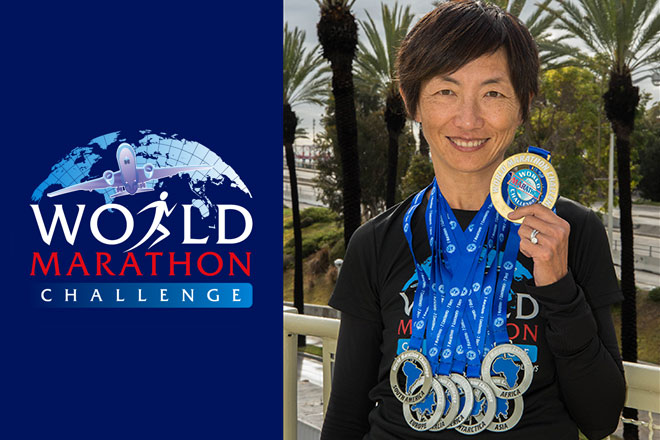
Pullias alumna runs 7 marathons on 7 continents in 7 days for charity
by Jonathan Riggs
A runner since 2011, Pullias alumna Shirley Parry long dreamed of running a marathon on each continent—but at a reasonable pace, say, one per year.
So how did she end up becoming one of only 138 people to ever complete the World Marathon Challenge—founded in 2012—of seven marathons on seven continents in seven days?
“Someone told me a pastor in L.A. trained for a year, completed the Challenge and raised a lot of money,” Parry, 54, said. “I believed if he could do it with proper training, so could I!”
As she began a year-long regiment to prepare, Parry was also inspired by the opportunity to give back to the Orthopaedic Institute for Children (OIC), an organization for which she’d long volunteered.
“I have seen firsthand the impact OIC has for children with musculoskeletal issues,” she said. “What better way to highlight what they do than for me to run for those who are unable to?”
And so, from Jan. 31 to Feb. 6 of this year, Parry completed races in Antarctica (Novo), Africa (Cape Town), Australia (Perth), Asia (Dubai), Europe (Madrid), South America (Santiago) and North America (Miami)—and raised more than $77,000 for OIC.
How did it feel to cross that final finish line in Florida?
Very emotional. I was fatigued mentally and physically; my muscles were sore and my feet hurt. And my father passed away in Vancouver at the time when we were flying from Antarctica to Cape Town. I had to put that aside for a few days and focus, but the emotions caught up during marathons #6 and #7. As I crossed the finish line, the first word I could think of was “relief.” Looking back, I am amazed that I finished!
What did it mean to you?
I proved to myself that I am mentally and physically stronger than I ever thought possible. However, I also think you have to know your limits. I successfully completed the World Marathon Challenge, but I did it at a pace that I knew I could achieve without pushing myself to injury. Through training and pushing my limits, I realized personal growth in knowing what to prioritize, what to let go and when to take a break.
What did you learn?
First, camaraderie. Since all the courses were loops, all participants saw each other multiple times during the run. I and some fellow runners made it a point to call out an encouragement to everyone else whenever our paths crossed. At first, I got some bemused and downright irritated looks, but gradually people would say thank you, or give me the thumbs up. From the fourth marathon on, everyone was high-fiving. It was a really good feeling to share an experience where we all wanted each other to succeed.
Secondly, it taught me about innate human kindness. Since most of our marathons started around or at midnight, volunteers in each country had to sacrifice a full night’s sleep to set up, prepare food and drinks and tear down when we were finally done. All of them were helpful, patient and kind. My pacers were invaluable—with a smile, they all logged miles and miles when they should be sleeping. Chinese New Year fell on the day we ran in Madrid. A group of students cheered us on, bringing us hot Chinese food and drinks. On a cold winter’s night when we were all exhausted, those gestures were a godsend.
What’s your takeaway?
Don’t be afraid to dream big. Very often it takes a leap of faith. After that first step, just keep moving forward, even though the road may seem long. Reward yourself often. I gave myself a year to train for this challenge. For me, logging the long runs on consecutive days was the hardest part. In hindsight, I realized it was as much mental training as it was physical. I had to plan mini-rewards after each run, like brunch or a massage. Although I like to run, I can’t go out and run just for the sake of it. Setting small goals and rewards along the way helps me reach my bigger goals.
__
Shirley Parry was a research assistant at the Pullias Center while completing her PhD in Urban Education Policy, which she received in 2016. While at USC, Parry researched the association between higher education structures and student loan default rate.